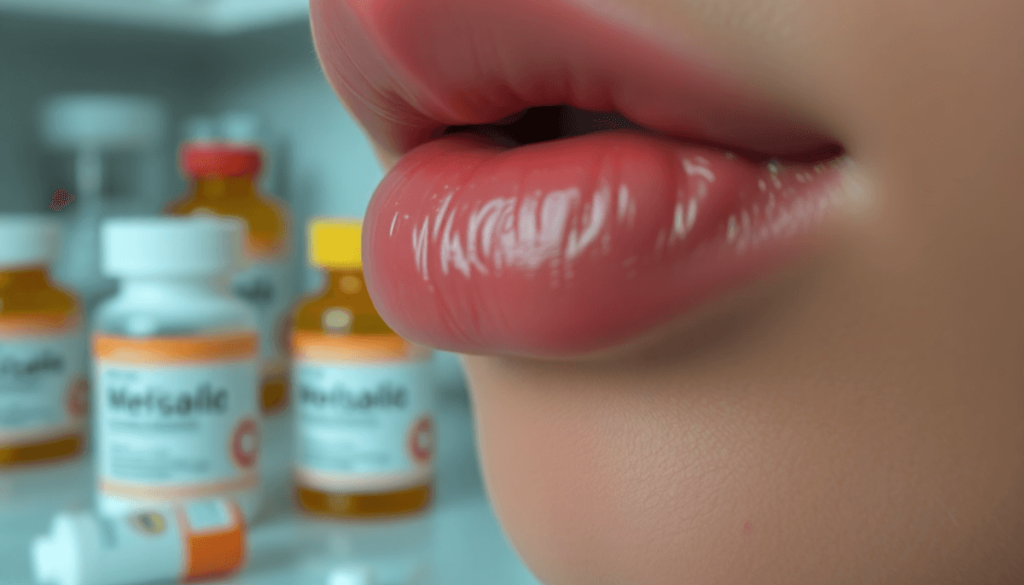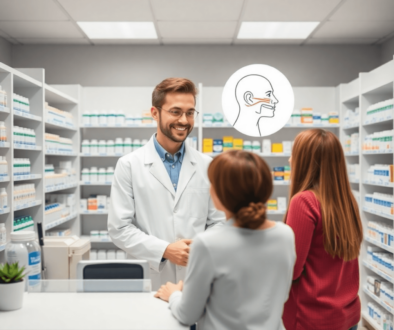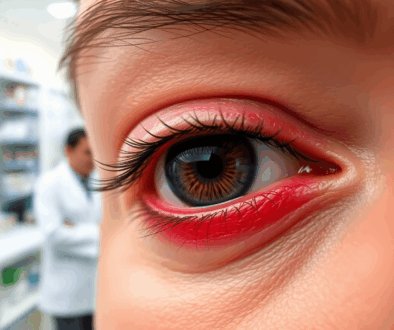Cold Sore vs. Canker Sore: Which Can Your Pharmacist Treat?
Cold sores and canker sores are common mouth sores with distinct characteristics and treatments. Understanding the difference between these two conditions is essential for effective management.
Recognizing whether you have a cold sore or a canker sore is crucial for receiving the right treatment. Pharmacists play a critical role in advising on and providing treatments for both cold sores and canker sores. They also offer valuable insights into pharmacy services that enhance medication access and care, especially for seniors.
Moreover, with the advent of technology, online pharmacy services have become increasingly popular. These services provide safe, fast, and private options for obtaining medications. In some cases, such as in Toronto, same-day prescription delivery is transforming healthcare by improving medication access and patient convenience.
For those requiring ongoing treatment, understanding the nuances of prescription delivery methods can also be beneficial. For instance, one might wonder whether to choose a courier or mail service for prescription delivery, each having its pros and cons in terms of speed, safety, and convenience.
Understanding Cold Sores
What are Cold Sores?
Cold sores, also known as fever blisters, are small fluid-filled blisters that typically appear on or around the lips. They are caused by the Herpes Simplex Virus (HSV-1), a highly contagious virus that spreads through close personal contact. Once infected, the virus remains dormant in nerve cells and can reactivate periodically, leading to recurrent outbreaks of cold sores.
Common Symptoms of Cold Sores
The onset of a cold sore is often preceded by a tingling, itching, or burning sensation around the lips. This is followed by the development of painful fluid-filled blisters that eventually rupture and form crusts before healing. Other symptoms may include swelling, redness, and general discomfort in the affected area. Cold sores typically last for 7 to 14 days, with the most intense symptoms occurring during the initial stages of an outbreak.
By understanding the nature of cold sores and recognizing their symptoms, individuals can take appropriate steps to manage and treat these viral infections effectively.
For those seeking personalized treatment options, exploring personalized pharmaceutical care could be beneficial. This approach focuses on patient-centered service and utilizes technology to improve healthcare trends.
In addition to this, if you’re dealing with side effects from new medications prescribed for managing cold sores or any other condition, it’s essential to understand how pharmacies can assist you in this regard. They provide expert care and support which is crucial in managing side effects from new medications.
Moreover, it’s important to be aware of potential drug interactions with common supplements that you might be taking alongside your medication for cold sores. Understanding these interactions can lead to safer health outcomes.
Lastly, if you’re experiencing additional health issues such as bladder infections while dealing with cold sores, it’s crucial to seek medical advice for effective management and relief.
For those who prefer online consultations or prescriptions, knowing what makes an online pharmacy the best in Toronto could be helpful in making informed decisions about your healthcare provider.
Treatment Options for Cold Sores
Antiviral treatments play a crucial role in managing cold sores effectively. Here are some key points to consider:
1. Antiviral Creams
These topical treatments help reduce the severity and duration of cold sore outbreaks. They work by inhibiting the growth of the herpes simplex virus (HSV) responsible for cold sores. Examples of antiviral creams include docosanol and penciclovir, which can be applied directly to the affected area multiple times a day.
2. Aciclovir
This antiviral medication is available in various forms, including creams, ointments, and oral tablets. Aciclovir helps speed up the healing process of cold sores and reduces the frequency of recurrent outbreaks. It is often recommended for severe or persistent cases of cold sores.
3. Cold Sore Patches
These adhesive patches contain hydrocolloid technology that creates a moist environment to promote faster healing of cold sores. They provide a protective barrier over the sore, reducing pain and preventing secondary infection.
Pharmacists play a vital role in providing advice on the appropriate use of these treatments for cold sores. They can recommend suitable products based on the individual’s symptoms and medical history, ensuring effective management of cold sore outbreaks. Remember to consult your pharmacist for personalized recommendations tailored to your specific needs.
In some cases, you may need to renew your prescription for antiviral medications like Aciclovir without seeing your doctor. In Ontario, there are ways to request prescription renewals using online consults or telehealth services, which can be facilitated by pharmacists. For more information on how to navigate this process, check out this guide on how to request prescription renewals without seeing your doctor in Ontario.
Preventive Measures for Cold Sores
Preventing cold sore outbreaks involves a combination of managing triggers and maintaining good hygiene practices. Key strategies include:
- Identifying and Managing Stress Triggers: Stress is one of the most common triggers for cold sores. Techniques such as regular exercise, meditation, and adequate sleep can help reduce stress levels and lower outbreak frequency. Additionally, exploring accessible healthcare options like medication management through pharmacies can significantly aid in stress management.
- Maintaining Hand Hygiene: Frequent hand washing minimizes the risk of spreading the herpes simplex virus to other parts of your body or to other people. Avoid touching cold sores directly whenever possible.
- Minimizing Exposure to Known Triggers: Factors like excessive sunlight, fatigue, hormonal changes, and illness can provoke outbreaks. Using lip balms with sunscreen and managing lifestyle factors helps reduce these risks. This could also involve non-prescription solutions for weight management support, which can assist in maintaining a healthier lifestyle.
- Avoiding Direct Contact During Outbreaks: Refrain from kissing or sharing utensils, towels, or lip products when cold sores are active to prevent transmission.
Pharmacists can provide personalized advice on trigger management tailored to your lifestyle, reinforcing the importance of prevention in the Cold Sore vs. Canker Sore: Which Can Your Pharmacist Treat? discussion.
Understanding Canker Sores
Canker sores, also known as mouth ulcers, are small, shallow lesions that develop inside the mouth. Unlike cold sores, they are non-contagious and do not result from viral infections. These painful ulcers typically appear on the inner cheeks, lips, tongue, or gums. You might notice a round or oval shape with a white or yellowish center and a red border.
Common causes of canker sores include:
- Minor injuries: accidental cheek biting, aggressive tooth brushing, or irritation from dental appliances such as braces or dentures.
- Food triggers: acidic or spicy foods like citrus fruits, tomatoes, or certain nuts can irritate the mucous membranes.
- Stress and hormonal changes: emotional stress and fluctuations in hormone levels often correlate with outbreaks.
- Nutritional deficiencies: lack of essential vitamins like B12, iron, or folic acid can contribute to their development.
- Allergic reactions: sensitivity to ingredients in toothpaste, mouthwash, or certain foods.
- Underlying health conditions: autoimmune disorders and gastrointestinal diseases may increase susceptibility.
Recognizing canker sores and understanding their causes helps you manage symptoms effectively. Since these ulcers are not contagious, they don’t require antiviral treatments but focus on soothing discomfort and addressing underlying factors.
Pharmacists can provide valuable advice on managing pain and reducing irritation caused by canker sores. It’s important to note that when seeking medication online for relief, there are some common misconceptions about online prescription safety that one should be aware of for safer medication use.
Treatment Options for Canker Sores
Different treatment approaches focusing on symptom relief for canker sores include:
- Antimicrobial Mouthwashes: These mouthwashes help reduce the microbial load in the mouth, preventing infections and promoting healing of canker sores. They can also provide a soothing effect and alleviate discomfort associated with the sores.
- Painkillers: Over-the-counter painkillers in various forms such as gels, sprays, or oral medications can help manage the pain and discomfort caused by canker sores. These products work by numbing the affected area, providing temporary relief from soreness. For more extensive options, one might consider managing allergies with over-the-counter and prescription options which could offer additional insights into pain management strategies.
- Corticosteroid Lozenges: For severe cases of canker sores that are particularly painful or persistent, corticosteroid lozenges prescribed by pharmacists or doctors may be recommended. These lozenges contain steroids that help reduce inflammation and promote healing of the ulcers.
By utilizing these treatment options, individuals suffering from canker sores can effectively manage their symptoms and facilitate the healing process. It is essential to consult with a pharmacist or healthcare provider to determine the most suitable treatment approach based on the severity and persistence of the canker sores.
Contrasting Cold Sores and Canker Sores: A Pharmacist’s Perspective
Viral Infection vs. Non-infectious Ulcers
Cold sores are caused by the herpes simplex virus (HSV), while canker sores are not infectious and have various triggers like minor injuries, stress, or allergies. Pharmacists can differentiate between the two based on symptoms and provide appropriate guidance for treatment options.
Medication vs. Symptom Relief
The treatment of cold sores typically involves antiviral medications to target the viral infection directly. On the other hand, canker sores are managed with symptom-relief products like antimicrobial mouthwashes and painkillers to alleviate discomfort. Pharmacists play a crucial role in recommending suitable remedies based on the type of mouth sore presented by the patient.
Cold Sore vs. Canker Sore: Which Can Your Pharmacist Treat?
Pharmacists can provide guidance and over-the-counter treatments for both cold sores and canker sores.
- For cold sores, pharmacists offer antiviral creams, patches, and pain relief medications.
- When it comes to canker sores, pharmacists recommend antimicrobial mouthwashes, pain-relief gels or sprays, and corticosteroid lozenges for severe cases.
By understanding these distinctions, patients can seek appropriate help from pharmacists for effective management of their specific mouth sore condition.
The Role of Pharmacists in Treating Mouth Sores
Pharmacists are easily accessible healthcare professionals who can provide valuable guidance on treating mouth sores such as cold sores or canker sores. Their expertise helps you navigate the wide range of products and remedies available, ensuring safe and effective management of your symptoms.
How Pharmacists Can Help
Here are some key ways in which pharmacists can assist you:
1. Assessing Your Symptoms
Pharmacists will evaluate your specific symptoms, including the location of the sores, how often they occur, and any underlying health factors that may be relevant. This assessment will help them determine the most appropriate treatment for you.
2. Tailoring Treatment Recommendations
For cold sores, pharmacists may recommend antiviral creams like aciclovir or soothing patches that protect blisters during the healing process. They may also provide insights on [how pharmacists prescribe for skin conditions](https://misterpharmacist.com/uncategorized/can-pharmacists-prescribe-for-skin-conditions-what-you-need-to-know), which could improve access to care and safety. For canker sores, they might suggest pain-relief gels, antimicrobial mouthwashes, or protective pastes to reduce irritation.
3. Educating You on Proper Use
Pharmacists will guide you on how to correctly apply topical treatments and when to seek medical attention if your symptoms worsen or do not improve within expected timeframes. In case you miss a dose of prescribed medications, [expert pharmacist tips](https://misterpharmacist.com/uncategorized/what-happens-when-you-miss-a-dose-expert-advice-from-pharmacists) can help you manage your medication safely and effectively.
4. Advising You on Preventive Measures
Pharmacists can provide tips for avoiding triggers that may cause flare-ups, such as [stress management strategies](https://misterpharmacist.com/all-about-meds/mental-health-medications-what-patients-should-know) for cold sores or dietary adjustments to minimize canker sore irritation.
Personalized Advice from Pharmacists
Pharmacists also offer personalized advice based on your medical history and the severity of your symptoms. They can help you understand the potential side effects and interactions of any other medications you may be taking.
By engaging with your pharmacist, you can ensure that your treatment for mouth sores is both efficient and tailored to your specific needs. This empowers you to effectively manage these uncomfortable conditions on your own.
Conclusion
Knowing the difference between cold sores and canker sores helps you get the right treatment quickly. Pharmacist intervention in treating mouth sore conditions ensures that you receive tailored advice and effective remedies suited to your specific symptoms and the severity of your condition. Pharmacists are accessible healthcare professionals who can guide you through antiviral options for cold sores or symptom relief products for canker sores, helping you manage discomfort and promote healing.
Take control of your oral health by consulting a pharmacist when mouth sores appear. With the rise of online pharmacies, professional support is just a booking away, making it easier than ever to access the care you need.
- Book your appointment online today with MisterPharmacist, Toronto’s trusted online pharmacy known for its fast prescription delivery service.
- Assessments and prescriptions for minor ailments, including cold sores and canker sores, are available across Ontario
- Get timely, expert care designed to ease your pain and speed recovery
Your pharmacist is ready to help—reach out now to start feeling better sooner. For more information on what constitutes a minor ailment and when you should consult a pharmacist, visit our website.
FAQs (Frequently Asked Questions)
What is the difference between cold sores and canker sores?
Cold sores are contagious blisters caused by the Herpes Simplex Virus (HSV-1), typically appearing around the lips, while canker sores are non-contagious mouth ulcers that occur inside the mouth due to various causes such as stress or injury.
Can pharmacists treat both cold sores and canker sores?
Yes, pharmacists play a vital role in managing both cold sores and canker sores by recommending appropriate treatments based on symptoms and severity, including antiviral creams for cold sores and symptom relief options for canker sores.
What are the common treatment options available for cold sores?
Common treatments for cold sores include antiviral creams like Aciclovir and cold sore patches, which pharmacists can provide along with advice on effective usage to manage outbreaks.
How can I prevent cold sore outbreaks effectively?
Preventive measures for cold sores include managing stress triggers, maintaining good hand hygiene, and minimizing exposure to known triggers, all of which help reduce the frequency and severity of outbreaks.
What treatments do pharmacists recommend for canker sore relief?
Pharmacists often suggest antimicrobial mouthwashes, painkillers, and corticosteroid lozenges to alleviate pain and promote healing of canker sores.
Why is pharmacist consultation important when dealing with mouth sores?
Pharmacist consultation ensures appropriate treatment selection tailored to the type of mouth sore—whether viral or non-infectious—helping patients effectively manage symptoms and improve recovery while providing expert guidance on product use.



